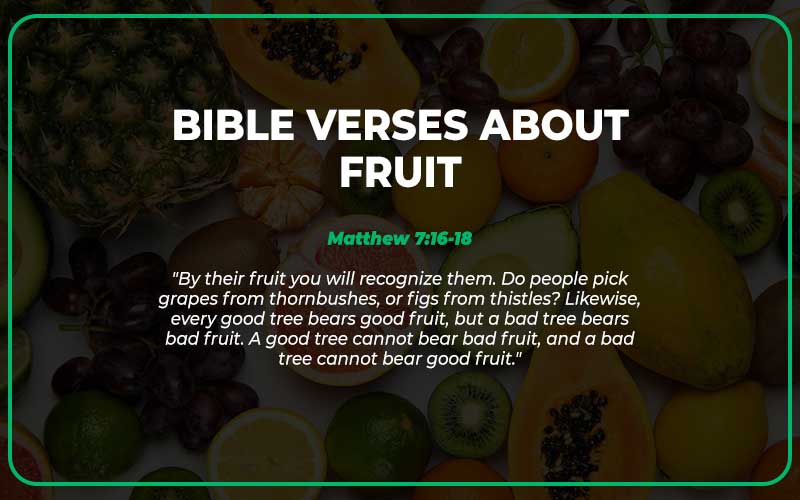Fruit is a symbol of abundance, life, and joy in the Bible. From the beginning of creation, God gave us fruit as a source of nourishment and sustenance. Even today, eating fruit is a great way to stay healthy and get the vitamins and minerals your body needs.
Today, we’ll explore some of the Bible verses about fruit and the many life lessons we can learn from them.
Bible Verses About Fruit
Matthew 7:16-18
“By their fruit you will recognize them. Do people pick grapes from thornbushes, or figs from thistles? Likewise, every good tree bears good fruit, but a bad tree bears bad fruit. A good tree cannot bear bad fruit, and a bad tree cannot bear good fruit.”
Luke 6:43-45
“No good tree bears bad fruit, nor does a bad tree bear good fruit. Each tree is recognized by its own fruit. People do not pick figs from thornbushes, or grapes from briers. A good man brings good things out of the good stored up in his heart, and an evil man brings evil things out of the evil stored up in his heart. For the mouth speaks what the heart is full of.”
Galatians 5:16-17
“So I say, walk by the Spirit, and you will not gratify the desires of the flesh. For the flesh desires what is contrary to the Spirit, and the Spirit what is contrary to the flesh. They are in conflict with each other, so that you are not to do whatever you want.”
Galatians 5:22-23
“But the fruit of the Spirit is love, joy, peace, forbearance, kindness, goodness, faithfulness, gentleness, and self-control. Against such things, there is no law.”
Bible Verses About Fruitfulness
In the Bible, the term “fruitfulness” generally refers to the ability to grow, be productive, and experience prosperity. It appears frequently in the Bible and is often seen as a sign of God’s favor or as an outcome of living a life of faith and obedience.
Fruitfulness is also used metaphorically to describe spiritual growth and the blossoming of someone’s relationship with God. This concept is not only about material abundance or fertility, but also encompasses personal growth, building one’s character, and making a positive impact on others.
The promise of fruitfulness in the Old Testament is often tied to the covenant between God and the people of Israel, where obedience to His commandments grants them the ability to be fruitful and multiply.
Meanwhile, in the New Testament, Jesus emphasizes the significance of spiritual fruitfulness through parables and teachings. He emphasizes the importance of establishing a strong connection with God as it leads to a fulfilling life of good deeds and positive impact on others.
Genesis 1:22-23
“And God blessed them, saying, ‘Be fruitful and multiply and fill the waters in the seas, and let birds multiply on the earth.’ And there was evening and there was morning, the fifth day.”

Psalm 1:3
“They are like trees planted by streams of water, which yield their fruit in its season, and their leaves do not wither. In all that they do, they prosper.”
John 15:16
“You did not choose me, but I chose you and appointed you so that you might go and bear fruit—fruit that will last—and so that whatever you ask in my name the Father will give you.”
Galatians 5:22-23
“But the fruit of the Spirit is love, joy, peace, forbearance, kindness, and self-control. Against such things there is no law.”
Colossians 1:10
“so that you may live a life worthy of the Lord and please him in every way: bearing fruit in every good work, growing in the knowledge of God.”
Also Read: Top 25 Bible Verses on Believing in Yourself
Bible Verses About Fruit Trees
The Bible uses fruit trees to symbolize spiritual growth, prosperity, and nourishment. They are a representation of the source of life and sustenance, as well as the rewards of a faithful relationship with God. They also represent wisdom and knowledge, with their roots grounded in faith and branches bearing fruits of righteousness and good deeds.
In both the Old and New Testaments, fruit trees are used as metaphors to teach moral and spiritual lessons. They are utilized to emphasize the importance of planting and nurturing one’s spiritual life so it may grow strong and produce good fruits. The process of growth and development is necessary for maintaining a deep and meaningful relationship with God.
Psalm 92:12-14
“The righteous will flourish like a palm tree, they will grow like a cedar of Lebanon; planted in the house of the Lord, they will flourish in the courts of our God. They will still bear fruit in old age, they will stay fresh and green,”
Jeremiah 17:7-8
“But blessed is the one who trusts in the Lord, whose confidence is in him. They will be like a tree planted by the water that sends out its roots by the stream. It does not fear when heat comes; its leaves are always green. It has no worries in a year of drought and never fails to bear fruit.”
Matthew 7:17-19
“Likewise, every good tree bears good fruit, but a bad tree bears bad fruit. A good tree cannot bear bad fruit, and a bad tree cannot bear good fruit. Every tree that does not bear good fruit is cut down and thrown into the fire.”
Luke 6:43-44
“No good tree bears bad fruit, nor does a bad tree bear good fruit. Each tree is recognized by its own fruit. People do not pick figs from thornbushes, or grapes from briers.”
John 15:1-2
“I am the true vine, and my Father is the gardener. He cuts off every branch in me that bears no fruit, while every branch that does bear fruit he prunes so that it will be even more fruitful.”
Bible Verses About Bearing Fruit
In the Bible, bearing fruit means showing the visible outcomes of a person’s spiritual growth and connection with God. It is a crucial part of leading a life of faith because it displays the transformational power of God in one’s life.
It doesn’t solely refer to personal achievements or material possessions; instead, it also covers the evolution of an individual’s character and the influence of their actions on those around them.
The Bible uses the metaphor of bearing fruit to explain how one can be more like Christ and create good outcomes. Essentially, this involves improving one’s faith, virtues, and positive deeds that impact others. This process is constant and necessitates dedication, commitment, and a close bond with God.
Matthew 13:23
“But the seed falling on good soil refers to someone who hears the word and understands it. This is the one who produces a crop, yielding a hundred, sixty or thirty times what was sown.”
Mark 4:20
“Others, like seed sown on good soil, hear the word, accept it, and produce a crop—some thirty, some sixty, some a hundred times what was sown.”
John 15:4-5
“Remain in me, as I also remain in you. No branch can bear fruit by itself; it must remain in the vine. Neither can you bear fruit unless you remain in me. I am the vine; you are the branches. If you remain in me and I in you, you will bear much fruit; apart from me you can do nothing.”

John 15:8
“This is to my Father’s glory, that you bear much fruit, showing yourselves to be my disciples.”
Philippians 1:11
“filled with the fruit of righteousness that comes through Jesus Christ—to the glory and praise of God.”
Also Read: 29 Bible Verses About Mistreating Your Wife
Bible Verses About Fruits and Vegetables
The Bible portrays fruits and vegetables as sources of physical nourishment as well as having symbolic meanings that relate to spiritual growth and wellness. They represent the gifts and blessings that God provides to those who maintain a close relationship with Him.
Fruits and vegetables symbolize the abundance and variety of God’s provisions, as well as the significance of nurturing spiritual growth to achieve a healthy and fruitful life.
The Bible teaches that fruits and vegetables are symbols of God’s love and concern for His people. They are used to highlight the significance of gratitude, modesty, and reliance on God’s provisions.
By acknowledging and being thankful for the material and spiritual nourishment that God gives, followers are motivated to live lives that are full of appreciation, trust, and generosity towards others.
Genesis 1:29
“Then God said, ‘I give you every seed-bearing plant on the face of the whole earth and every tree that has fruit with seed in it. They will be yours for food.'”
Leviticus 19:23
“When you enter the land and plant any kind of fruit tree, regard its fruit as forbidden. For three years you are to consider it forbidden; it must not be eaten.”
Deuteronomy 8:8
“a land with wheat and barley, vines and fig trees, pomegranates, olive oil and honey;”
Ezekiel 47:12
“Fruit trees of all kinds will grow on both banks of the river. Their leaves will not wither, nor will their fruit fail. Every month they will bear fruit, because the water from the sanctuary flows to them. Their fruit will serve for food and their leaves for healing.”
Galatians 5:19-21
“The acts of the flesh are obvious: sexual immorality, impurity and debauchery; idolatry and witchcraft; hatred, discord, jealousy, fits of rage, selfish ambition, dissensions, factions and envy; drunkenness, orgies, and the like. I warn you, as I did before, that those who live like this will not inherit the kingdom of God.”
Bible Verses About Spiritual Fruits
Spiritual fruits refer to the concrete results of a person’s development and progress in their connection with God. They are apparent signs of the Holy Spirit’s influence in one’s life, and are commonly referred to as virtues or admirable personality traits.
The New Testament lists the most recognizable spiritual fruits, which include love, joy, peace, patience, kindness, goodness, faithfulness, gentleness, and self-control.
The spiritual fruits are traits that not only apply to oneself, but also determine how believers interact with the world and other people. They show the remarkable effects of the Holy Spirit and demonstrate an authentic connection with God. As people grow and develop these spiritual fruits, they become more like Christ and are better prepared to make a positive difference in the lives of others.
Within the Bible, spiritual fruits are regularly juxtaposed with the works of the flesh, which involve demeanors and mindsets that go against the desires of God.
This comparison highlights the value of leading a life steered by the Holy Spirit, which results in the expansion of one’s spiritual being and the establishment of godly qualities. Individuals who follow this faith are urged to search for and strive towards these spiritual fruits by means of prayer, contemplation, and further developing their bond with God.
Believers can enhance their relationship with God and have a positive impact on the world through spiritual fruitfulness. It takes a lifelong commitment and effort to achieve spiritual growth and maturity, as well as relying on God’s guidance and grace.
Galatians 5:22-23
“But the fruit of the Spirit is love, joy, peace, forbearance, kindness, goodness, faithfulness, gentleness and self-control. Against such things there is no law.”

Ephesians 5:8-9
“For you were once darkness, but now you are light in the Lord. Live as children of light (for the fruit of the light consists in all goodness, righteousness and truth)”
Philippians 4:17
“Not that I desire your gifts; what I desire is that more be credited to your account.”
Colossians 1:9-10
“For this reason, since the day we heard about you, we have not stopped praying for you. We continually ask God to fill you with the knowledge of his will through all the wisdom and understanding that the Spirit gives, so that you may live a life worthy of the Lord and please him in every way: bearing fruit in every good work, growing in the knowledge of God,”
Hebrews 12:11
“No discipline seems pleasant at the time, but painful. Later on, however, it produces a harvest of righteousness and peace for those who have been trained by it.”
Also Read: Top 35 Bible Verses About Free
What Does Jesus Say About Fruit?
In the Bible, Jesus uses fruit as a metaphor for spiritual growth and character. In the book of Matthew, Jesus explains that good trees bear good fruit while bad trees bear bad fruit. A person can recognize someone by their fruit.
He also explains in the book of John that a person can bear much fruit by remaining in Him, and without Him, we can do nothing. Jesus emphasizes the importance of having a close relationship with Him and living according to His teachings to bear good fruit.
What Scripture Says About Good Fruits?
There are several scriptures in the Bible that talk about good fruits and the importance of producing them in our lives:
Galatians 5:22-23 – “But the fruit of the Spirit is love, joy, peace, forbearance, kindness, goodness, faithfulness, gentleness, and self-control. Against such things, there is no law.”
Matthew 7:17-18 – “Likewise, every good tree bears good fruit, but a bad tree bears bad fruit. A good tree cannot bear bad fruit, and a bad tree cannot bear good fruit.”
Colossians 1:10 – “so that you may live a life worthy of the Lord and please him in every way: bearing fruit in every good work, growing in the knowledge of God.”
James 3:17 – “But the wisdom that comes from heaven is first of all pure; then peace-loving, considerate, submissive, full of mercy and good fruit, impartial and sincere.”
Luke 6:43 – “No good tree bears bad fruit, nor does a bad tree bear good fruit.”
The scriptures highlight the significance of generating positive results in our lives. These results arise from living according to God’s wishes and following the Holy Spirit’s direction.
Examples of these positive outcomes include love, joy, peace, kindness, and self-control. These fruits show that we are on the right track with God and living for His purposes. By doing so, we bring honor to Him.
What Does Fruit Represent in the Bible?
In the Bible, fruit is often used as a metaphor to represent various things, depending on the context. Here are a few examples:
Spiritual Growth
Jesus often uses fruit as a metaphor to symbolize the spiritual progression and change that occurs in a believer’s life. He says in John 15:5, “I am the vine; you are the branches. If you remain in me and I in you, you will bear much fruit; apart from me, you can do nothing.”
Character and Deeds
The New Testament often refers to fruit as a way to describe a person’s character and actions. Galatians 5:22-23 features a list called the “fruit of the Spirit,” which includes love, joy, peace, patience, kindness, goodness, faithfulness, gentleness, and self-control. This section emphasizes that these virtues are created in a believer’s life as they follow the guidance of the Holy Spirit.
Repentance and Righteousness
Matthew 3:8 records John the Baptist’s message to the Pharisees and Sadducees, which was to “Produce fruit in keeping with repentance.” This implies that producing fruit is an indication of true repentance and a life that reflects righteousness and obedience to God.
Harvest
The Bible also uses fruit to symbolize the harvest of crops, which was crucial for the economy and survival of ancient individuals.
In the Bible, fruit is used metaphorically to convey growth, character, and as evidence of obedience to God.

